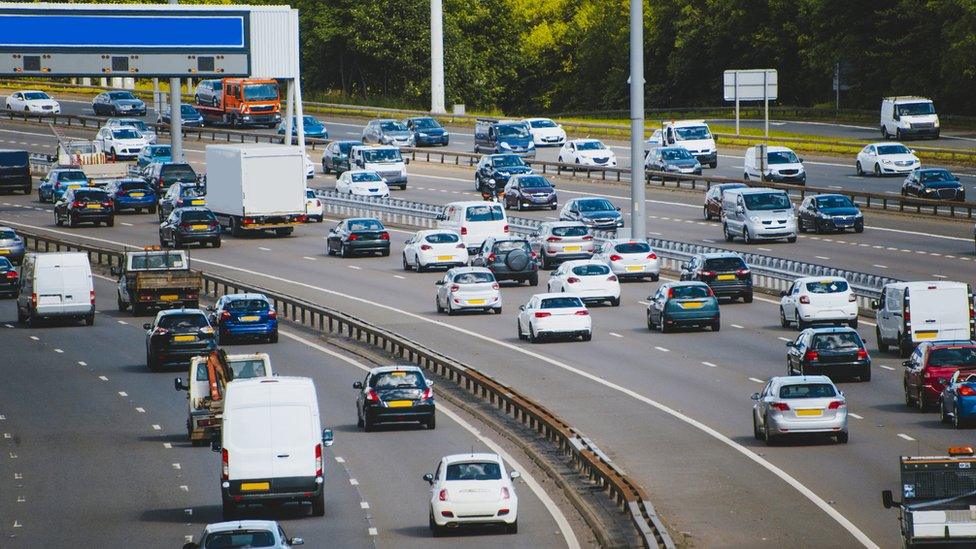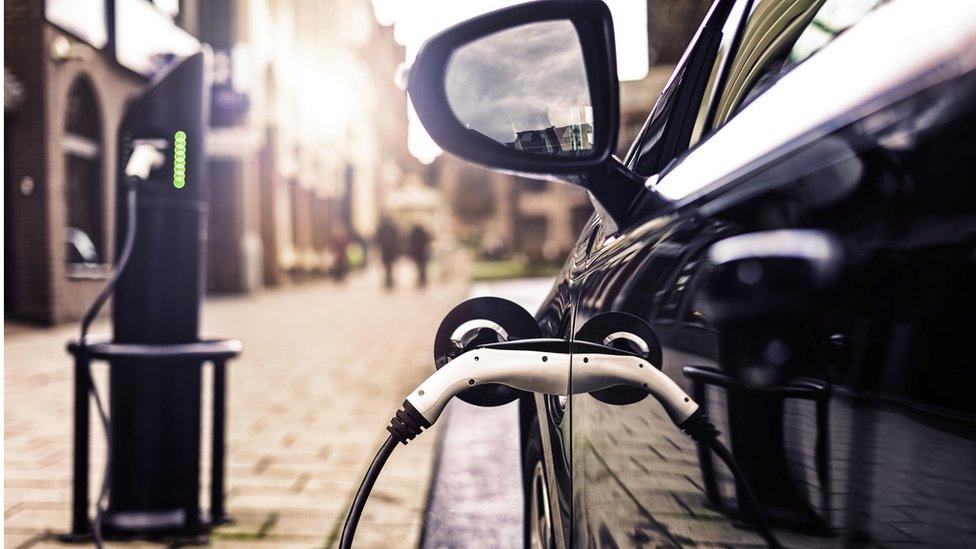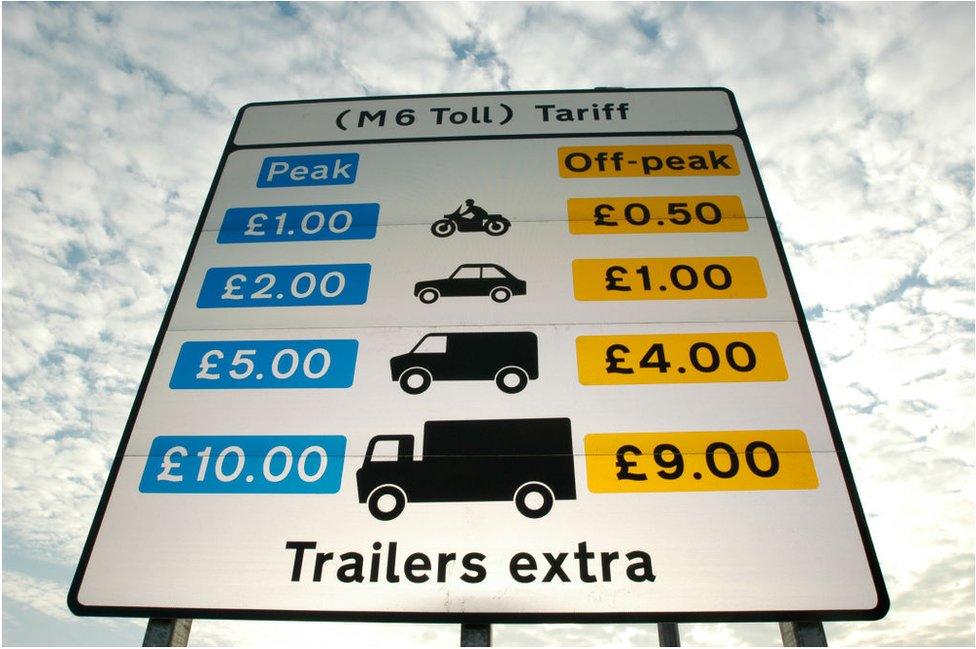Are road tolls the direction of travel?
- Published

Holyrood leaders have clashed over road tolls, yet the direction of travel for both UK and Scottish governments is towards introducing a version of them.
Pressure is building as the shift to electric vehicles deprives the Treasury of an important revenue source, while public opinion seems to have been on the move.
Introducing them in Scotland would involve complexities around constitutional powers over roads and over taxation.
"When you come to a fork in the road, take it" - the time-honoured homespun wisdom of baseballer and US quote machine Yogi Berra could apply to the direction of travel at Holyrood.
First Minister's Questions this week featured an exchange about the cost of motoring. An election brings a fork in the road. And the parties are taking it.
Will the first minister give a categorical answer that she will not bring in road tolls, asked Scottish Tory leader Douglas Ross? That was alongside other challenges about the possible introduction of city congestion and workplace parking charges.
"I don't support road tolls," replied Nicola Sturgeon - eventually, though she said a lot more than that, about the need to take "difficult, tough, challenging" decisions if carbon emissions are to be reduced.
The exchange had a lot to do with local council elections, of course, and the first minister was also eager to emphasise the role of councillors in deciding their own priorities - including SNP ones in Edinburgh and Glasgow, who are looking at traffic management options.
However, the FM's opposition to road tolls may have come as a surprise to those who work for her, and who have been working on precisely that.
And Douglas Ross's opposition to it also seems to be at odds with his own party's desire to reduce transport emissions. Road pricing is the direction of policy among his Tory MP and ministerial colleagues in Whitehall.
Out of fuel
So why is "Prepare for road pricing" flashing so prominently on the gantry signs of the policy motorway?
Partly, it's down to those net zero targets. Transport is a big emitter of carbon. Getting people out of cars and into public transport is part of the solution.
Governments in Westminster and Holyrood, now in charge of railways, are experimenting with cut-price tickets to try to boost use of trains post-Covid. Stagecoach has this week opened a new contact centre in Perth - so far only for Scots, and soon for all of Britain - to improve the customer service end of bus travel.
It is also because the UK's current tax regime is poorly targeted and literally running out of fuel.

A shift to electric vehicles could see an important source of government revenue from fuel duty drying up
Once you have paid your annual vehicle excise duty, it doesn't matter how much you drive, or when or where. It leaves no disincentive to use of the road where and when you choose. And if you've got a hybrid or plug-in electric car, you don't pay any.
Most of the tax on motorists is levied on fuel, at 53 pence per litre, plus 20% VAT. These taxes together raise more than £35bn a year, with a VAT windfall while prices are so high. That's an important source of Treasury revenue - roughly 4%, and about 80% of that goes into public services other than roads.
Rush hour or rural
If other government net zero policy is successful in replacing the internal combustion engine with electric vehicles, all of that revenue is going to dry up by 2040.
Yet electric vehicles still need roads and other infrastructure. So how is that to be funded, plus those other public services, at the same time as reducing congestion?

Road tolls are currently in operation on a small number of roads in England
The answer looks increasingly like road pricing - a charge for each mile travelled, based on which road is used and at what time of day.
Using such a system, the more you use busy city roads and during rush hour, the more you pay. If you use a quiet rural road, then the charge per mile would be much lower.
A committee of MPs recommended in February some form of road pricing, based on the road used and the type of vehicle.
"The government must start an honest conversation with the public," said the MPs' report.
It had the look of a choreographed move towards Whitehall softening up public opinion, though the UK government response is still awaited. Perhaps it's been distracted by something.
Battery resistance
Seventeen years ago, then transport secretary Alistair Darling tried to introduce road pricing, and he was burnt by both petrolheads (usually including newspaper editors) and those who fear for the civil liberty implications of satellite tracking every vehicle.
Around the same time, Edinburgh voted heavily against a congestion charge in a city-wide referendum, also knocking the policy firmly back into the filing cabinet marked "politically too difficult".
But times have changed. Surveillance of your movement is normalised through phone networks. Pollution and emissions have become top priorities. Urban congestion has worsened, and a one-for-one replacement of petrol-fuelled cars with electric ones does nothing to ease it.

Persuading motorists to give up fossil fuel vehicles is a big part of climate change plans
Public opinion has been on the move. As part of that choreography, last month, the right-leaning Social Market Foundation released survey findings that suggest Tory and Labour voter support for road pricing is on the rise: 44% of Tory voters in favour to 25% against, and among Labour supporters, 39% to 24%.
Part of the challenge now is to introduce any new charging before resistance builds up from electric vehicle drivers. While the case can be made for a revenue neutral switch, with the total bill being no higher under road pricing than under current tax, any change is going to mean increased costs for EV owners.
Route map
The position in Scotland is more complex. All current revenue on vehicle and fuel tax goes to the Treasury. The MPs' case for a shift to road pricing applies as strongly in Scotland as anywhere else. But implementing road pricing on Scottish roads would surely require Holyrood's support, if not its lead.
The Reform Scotland think tank last month pitched in with a refreshed call for the change.
And the Scottish government has at least opened the door to the possibility, through its agency Transport Scotland setting out options for better traffic management by the middle of this decade. It notes that public opinion is now more for road pricing than against it.
When I asked for the Scottish government view, a Transport Scotland spokesperson referred to its "route map" for reducing car mileage by 20%, with research being commissioned into "a range of equitable options for demand management to discourage car use, including pricing."
The plan is intended to take into account the needs of rural travellers and those on low income.
The statement continued: "The research will allow Scottish government to build the evidence base on demand management options and inform our position on the reform of reserved motoring taxes.
"Meanwhile we will continue to press the UK government for constructive dialogue on its plans for structural reform of motoring taxation, which the UK government itself acknowledged is inevitable and required in their recent Net Zero Review."
In other words, Nicola Sturgeon's people are talking to Douglas Ross's colleagues, to figure out how to get to road pricing. Perhaps the party leaders should be told.
Related topics
- Published4 February 2022
